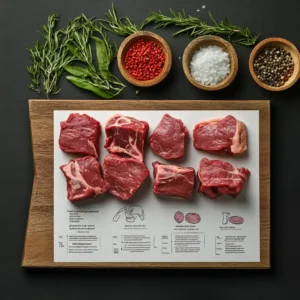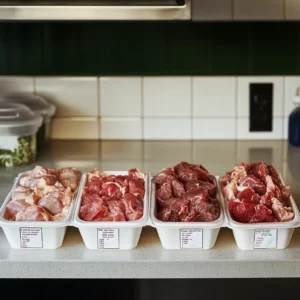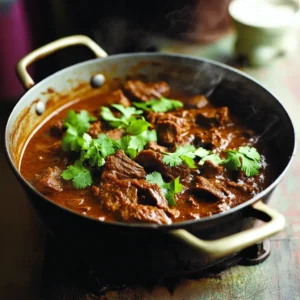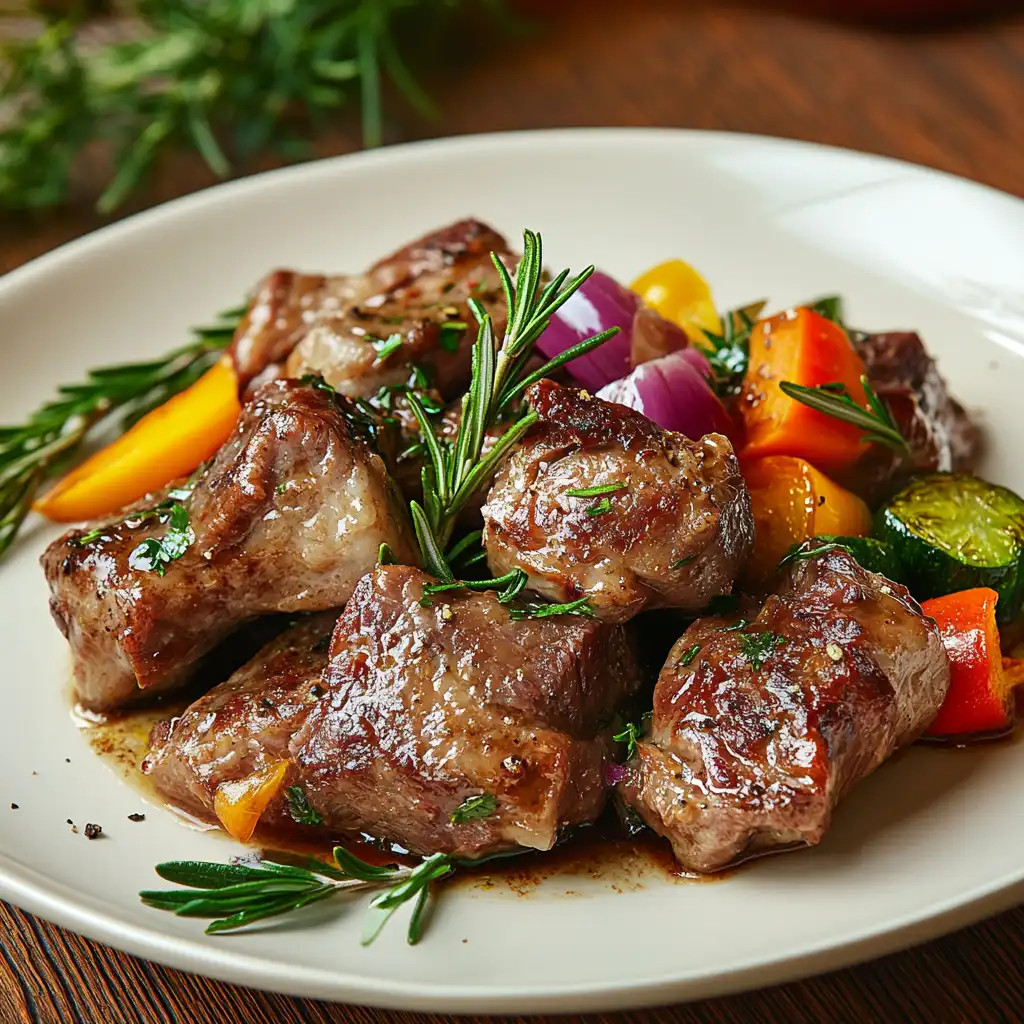Introduction
Goat meat, also known as “chevon” or “mutton” depending on the goat’s age, is a globally cherished protein. But is goat meat good to eat? Known for its slightly gamey flavor and exceptional nutritional benefits, goat meat is one of the leanest and most nutrient-dense meat options available. It plays a central role in traditional dishes across Africa, Asia, the Middle East, and the Caribbean, yet remains underappreciated in Western countries.
In this article, we’ll explore whether goat meat is good to eat by examining its nutritional value, health benefits, and culinary versatility. Additionally, we’ll address sustainability, debunk myths, and offer practical tips for preparing this underrated protein.
Nutritional Value of Goat Meat
Goat meat is a nutrient powerhouse that provides a lean, protein-rich alternative to other red meats. It stands out for its ability to deliver essential vitamins and minerals while being low in calories and fat.

Macronutrient Profile
A 100-gram serving of cooked goat meat typically contains:
- Calories: 143 kcal
- Protein: 27 grams
- Fat: 3 grams
- Carbohydrates: 0 grams
This macronutrient profile highlights why goat meat is so appealing. Its high protein content supports muscle development, while its low fat and calorie levels make it ideal for those seeking a leaner red meat option.
Vitamins and Minerals
oat meat is packed with nutrients essential for maintaining overall health:
- Iron: Aids in oxygen transport and prevents anemia. Compared to chicken or pork, goat meat offers higher levels of iron, making it a preferred choice for individuals with increased iron needs.
- Vitamin B12: Plays a critical role in nervous system health and energy production.
- Zinc: Boosts immunity, accelerates wound healing, and promotes skin health.
- Phosphorus and Selenium: These minerals are vital for bone health and cellular repair.
- Potassium: Helps regulate blood pressure and supports heart health.
Comparison with Other Meats
When compared to other popular protein sources, goat meat shines in many areas:
- It contains significantly less fat and cholesterol than beef, pork, or lamb, making it a heart-healthy option.
- Goat meat delivers more iron than chicken, which makes it especially valuable for individuals prone to anemia.
- While it has a distinct, slightly gamey flavor, it is less fatty than lamb and pairs well with a variety of spices and herbs.
Unique Nutritional Characteristics
Goat meat’s nutritional profile includes specific features that make it a standout choice:
- Easily Digestible: The lean nature of goat meat makes it easier to digest than fattier meats like lamb or pork.
- High Omega-3 Content: Contains omega-3 fatty acids, which are known for their anti-inflammatory properties and benefits for brain and heart health.
- Low Calorie Count: With fewer calories per serving compared to beef or pork, goat meat is suitable for weight-conscious individuals.
Health Benefits of Goat Meat
Goat meat offers a wide array of health benefits, making it an excellent addition to a balanced diet. Its high protein content, low fat, and rich nutrient profile contribute to overall well-being and support various health goals.
Supports Muscle Growth and Recovery
The high protein content in goat meat supports muscle development and recovery:
- It contains all essential amino acids required for muscle repair and tissue regeneration.
- For athletes or those engaging in regular exercise, goat meat provides sustained energy and promotes post-workout recovery.
Promotes Heart Health
Goat meat is a heart-friendly red meat option:
- Low in Saturated Fat: Unlike beef or pork, goat meat contains lower levels of unhealthy fats, reducing the risk of cardiovascular diseases.
- Cholesterol Levels: Its minimal cholesterol content makes it a smart choice for maintaining healthy blood lipid levels.
- Potassium Benefits: This nutrient supports blood pressure regulation, further contributing to heart health.
High Iron Content for Preventing Anemia
Iron is a standout nutrient in goat meat, making it an excellent choice for preventing anemia:
- It contains heme iron, which is more easily absorbed by the body compared to the non-heme iron found in plants.
- Regular consumption of goat meat can reduce fatigue and enhance oxygen transport in the blood.
Aids in Weight Management
The lean profile of goat meat makes it ideal for weight-conscious individuals:
- Low Calories and Fat: It offers fewer calories than other red meats, helping reduce overall caloric intake.
- Satiety: The high protein content promotes feelings of fullness, preventing overeating and aiding in weight control.
- Fat Content: With just 3 grams of fat per serving, goat meat is a guilt-free indulgence for red meat lovers.
Boosts Immune Health
Goat meat is rich in zinc and selenium, which play crucial roles in supporting the immune system:
- Zinc: Helps activate immune cells and supports skin health and wound healing.
- Selenium: Acts as a powerful antioxidant, reducing inflammation and protecting cells from damage.
How Goat Meat Compares to Other Meats
When selecting a protein source, comparing goat meat to other popular options like beef, lamb, and chicken reveals its distinct advantages. With a lean profile, impressive nutrient density, and culinary versatility, goat meat stands out as an excellent choice for those seeking a healthy alternative to traditional proteins.

Beef
- Lower Fat Content: Significantly leaner than beef, goat meat contains less saturated fat and overall fat, making it ideal for reducing cholesterol levels and managing weight.
- Fewer Calories: A 100-gram serving of goat meat provides about 143 calories, compared to roughly 250 calories in the same portion of beef.
- Higher Iron Levels: Goat meat is richer in iron, essential for preventing anemia and supporting oxygen transport, making it a particularly beneficial option.
- Distinct Flavor: With a mildly gamey taste, goat meat offers a unique flavor profile that is less intense than beef, making it well-suited to spiced dishes.
Lamb
- Lean Alternative: Although lamb is a popular red meat, goat meat is leaner and contains less fat, making it easier to digest and lower in calories.
- Protein Richness: Both are excellent protein sources; however, goat meat has a slightly higher protein content, adding a nutritional edge.
- Lower Cholesterol: Compared to lamb, goat meat has less cholesterol, making it a healthier option for heart-conscious individuals.
- Milder Gamey Taste: Goat meat’s taste is less fatty and slightly milder than lamb’s, appealing to those who prefer subtler flavors.
Chicken
- Higher Iron Content: Goat meat provides significantly more iron than chicken, which is crucial for individuals with high iron needs, such as pregnant women or athletes.
- Comparable Protein Levels: While both meats are excellent protein sources, goat meat also delivers higher levels of zinc and vitamin B12, enhancing its nutritional appeal.
- Low Fat Alternative: Goat meat’s fat content rivals that of chicken breast, offering a lean red meat option with similar health benefits.
- Distinct Flavor Profile: Unlike chicken’s mild taste, goat meat brings a richer and more robust flavor, making it a versatile ingredient for spiced or slow-cooked recipes.
Why Goat Meat Stands Out
Goat meat distinguishes itself as a lean, nutrient-packed, and flavorful option. Its lower fat content and rich mineral profile make it a healthy choice for those seeking variety in their protein sources. Whether slow-cooked in stews, grilled, or spiced for curries, goat meat proves its worth as a versatile and nutritious alternative to more common meats.
Culinary Versatility of Goat Meat
Goat meat’s rich flavor and adaptability make it a favorite in kitchens around the world. Its slightly gamey taste pairs beautifully with bold spices, slow-cooking techniques, and a variety of traditional and modern dishes. Whether used in curries, stews, or grilled recipes, goat meat brings depth and character to any meal.

Traditional and Modern Dishes
Goat meat plays a central role in many culinary traditions and is also making its way into modern cuisines:
- Curry Goat (Caribbean): A slow-cooked dish infused with curry powder, allspice, and thyme, curry goat is a beloved staple in Jamaican cuisine.
- Birria (Mexico): Originally made with goat meat, birria is a spicy stew served with consommé or as a taco filling.
- Mutton Korma (India): Goat meat is simmered in a yogurt-based sauce with a blend of aromatic spices, resulting in a creamy and flavorful curry.
- African Goat Stew: Across Africa, goat meat is used in hearty stews with root vegetables and regional spices.
- Grilled Goat Chops (Mediterranean): Marinated in olive oil, garlic, and rosemary, goat chops are grilled to perfection for a simple yet delicious meal.
Cooking Techniques for the Best Flavor
Cooking goat meat requires techniques that enhance its natural richness and ensure tenderness. Popular methods include:
- Slow Cooking: Braising and stewing are ideal for tougher cuts, allowing the meat to become tender while absorbing the flavors of spices and sauces.
- Grilling: Marinated goat meat grilled over an open flame brings out its smoky and savory notes.
- Roasting: A whole goat or large cuts, seasoned with herbs and spices, can be roasted for special occasions or large gatherings.
- Pressure Cooking: Modern pressure cookers reduce cooking time while maintaining the rich flavor and tenderness of goat meat.
Popular Goat Meat Recipes
Here are some popular recipes to try at home:
- Goat Meat Curry: A slow-cooked dish with coconut milk, curry spices, and tender chunks of goat meat.
- Spicy Goat Kebabs: Marinated pieces of goat meat skewered and grilled, perfect for barbecues.
- Goat Meat Stew: A comforting dish with root vegetables, tomatoes, and hearty broth.
- Birria Tacos: Goat meat braised in chili-based spices, served in soft tortillas with consommé for dipping.
- Grilled Goat Chops: Marinated in lemon juice, garlic, and herbs, then grilled until golden and juicy.
Pairing Goat Meat with Sides and Spices
The versatility of goat meat extends to the sides and spices it pairs with:
- Spices: Cumin, coriander, turmeric, and paprika enhance its rich flavor.
- Acidic Marinades: Lemon juice or yogurt tenderizes the meat and balances its gamey taste.
- Sides: Serve goat meat with rice, flatbreads, roasted vegetables, or legumes like lentils and chickpeas.
Sustainability and Ethical Considerations
Goat meat is not only a nutritious and flavorful option but also one of the most sustainable meat choices available. Its smaller environmental footprint and ethical farming practices make it a responsible protein source for eco-conscious consumers.
Environmental Benefits of Raising Goats
Compared to other livestock, goats are highly efficient and have a minimal environmental impact:
- Low Greenhouse Gas Emissions: Goats produce fewer greenhouse gases, such as methane, than cattle, reducing their contribution to climate change.
- Efficient Grazing: Goats can thrive in areas with sparse vegetation, consuming plants that other animals cannot digest. This ability prevents overgrazing and supports land conservation.
- Minimal Water Use: Goats require less water than larger livestock, making them a sustainable choice, especially in arid and semi-arid regions.
- Adaptability: Goats can be raised in diverse climates and terrains, from mountainous regions to dry plains, contributing to their sustainability.
Ethical Practices in Goat Farming
Goat farming is often associated with ethical and humane practices, particularly in smaller-scale operations:
- Free-Range Rearing: Many goats are raised in free-range environments, allowing them to graze naturally and engage in instinctive behaviors.
- Reduced Antibiotic Use: Unlike intensive farming practices for other livestock, goats are hardy animals that typically require fewer antibiotics or interventions.
- Traditional Farming: In many cultures, goats are raised using time-honored methods that prioritize animal welfare and sustainability.
Supporting Local Producers
Buying goat meat from local farmers supports ethical and sustainable agriculture while benefiting the local economy. Key advantages include:
- Lower Carbon Footprint: Purchasing locally reduces the emissions associated with transportation and processing.
- Transparency: Local farms often offer insights into their practices, ensuring humane treatment of animals and sustainable farming methods.
- Economic Benefits: Supporting local producers helps sustain rural communities and preserves agricultural traditions.
Challenges in Goat Meat Production
While goat farming is generally more sustainable than other livestock industries, challenges remain:
- Overgrazing Risks: In regions with high goat populations, overgrazing can lead to soil degradation and reduced biodiversity.
- Export and Import Dependency: Growing global demand for goat meat can strain local markets, increasing reliance on exports and imports, which may raise carbon emissions.
- Resource Allocation: Balancing water and grazing resources in areas with limited supply requires careful management.
FAQs
To address common questions about goat meat, here are answers to frequently asked queries that highlight its nutritional value, health benefits, and culinary uses.
Is goat meat healthy?
Yes, goat meat is a very healthy option. It is high in protein, low in fat, and rich in essential nutrients like iron, zinc, and vitamin B12. Its low cholesterol levels make it a heart-healthy alternative to other red meats.
What does goat meat taste like?
Goat meat has a slightly gamey flavor, similar to lamb but less fatty. Its rich and savory taste pairs well with bold spices, making it ideal for curries, stews, and grilled dishes.
Can goat meat be included in a weight-loss diet?
Absolutely. Goat meat is low in calories and fat while being high in protein, which helps promote satiety and muscle maintenance. Its lean nature makes it an excellent choice for weight-conscious individuals.
How do you tenderize goat meat?
Tenderizing goat meat can be done using acidic marinades with ingredients like lemon juice, vinegar, or yogurt. Slow cooking methods such as braising or stewing are also effective in breaking down tough fibers, resulting in tender and flavorful meat.
Is goat meat safe to eat regularly?
Yes, goat meat is safe and nutritious for regular consumption when properly cooked. Its low fat and high nutrient content make it a healthy addition to a balanced diet. As with any meat, it’s important to ensure it is fresh and cooked to the appropriate temperature.
Where is goat meat most commonly eaten?
Goat meat is widely consumed in Africa, the Middle East, Asia, and the Caribbean. It is also gaining popularity in Western countries due to its health benefits, sustainability, and unique flavor.
Conclusion
Goat meat is a nutritious, versatile, and sustainable protein option that deserves a spot in more diets worldwide. Its high protein content, low fat levels, and rich nutrient profile make it a healthy choice for those seeking a lean alternative to other red meats. Goat meat’s slightly gamey flavor pairs beautifully with bold spices and slow-cooking methods, making it ideal for a wide range of traditional and modern dishes.
Additionally, its smaller environmental footprint and ethical farming practices highlight goat meat as a responsible option for eco-conscious consumers. Whether you’re exploring its health benefits, culinary versatility, or sustainability, goat meat offers a unique and satisfying way to enjoy red meat.
By understanding how to select, cook, and incorporate goat meat into your meals, you can fully appreciate this underrated but highly beneficial protein source.

